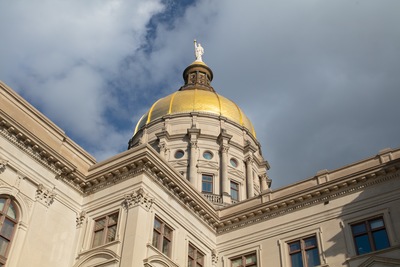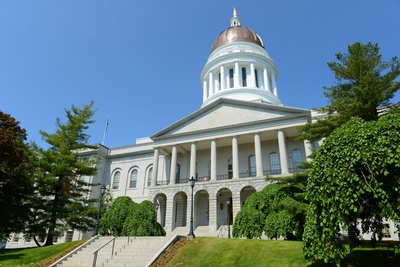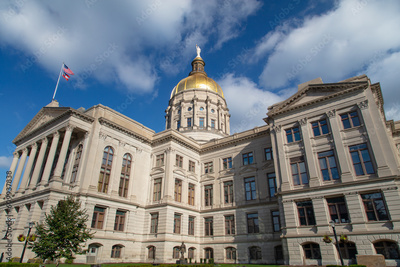
Compliance
States with Lobbying Compliance and Other Deadlines in December 2025
December 3, 2025 | Chase Klingensmith
May 20, 2024 | David Kobylka, Bradley Coffey

Key Takeaways:
Some say that compliance is not just a series of actions one takes to avoid penalties from the government, but a state of mind. One must constantly be thinking about risk mitigation to avoid being the subject of an unflattering indictment. Nothing could be more true when it comes to compliance with the numerous lobbying laws in the United States and Canada.
It’s important to always keep this compliance state of mind. Some of the things you should be asking yourself include:
What is lobbying?
Am I a lobbyist?
What states do I need to watch out for?
What are the consequences of not registering?
As the map below shows, states can generally be split into two groups: (1) states where registration is required prior to or shortly after making lobbying contacts (blue on the map), and (2) states where registration as a lobbyist is not required prior to making lobbying contacts (purple on the map).

Unfortunately, this is about where the similarities stop. Diving any deeper fractures the map into at least 50 different pieces (in some states, the rules are different based on which level or branch of government you are lobbying).
Despite being a diverse country in the way in which we regulate lobbying, there are some generalizations we can make that anyone meeting with legislators should keep in mind.
The first consideration that should be made when you meet with a public official or public employee is to ask “What is the intent of this meeting?” In the world of lobbying regulation, intent is everything and can mean the difference between registration, reporting, and qualifying for an exemption.
Those communicating or meeting with public officials or public employees with the intent to influence their official actions will likely need to register as a lobbyist. Absent the intent to influence, it is unlikely that you are engaging in reportable lobbying activity (unlikely, but not improbable, there are other variables to consider).
So go ahead and say hello to that legislator from Massachusetts at NCSL, ALEC, or the Council of State Governments. Exchanging pleasantries is unlikely to lead to a registration requirement (unless you’re in Alaska, Connecticut, Florida, Georgia, Hawaii, Idaho, Illinois, Indiana, Kansas, Maryland, Minnesota, Missouri, New York, North Carolina, Oregon, Pennsylvania, Tennessee, Texas, and Vermont where you may be required to register if that pleasantry exchange is intended to build goodwill with the legislator).
The next consideration that is important to the formula of lobbying registration is the state’s definition of lobbying. Generally, lobbying is attempting to influence government action or inaction (hence why intent is so important). Keep in mind that lobbying can include:
Legislative, executive, or administrative lobbying
Procurement lobbying
Grassroots lobbying campaigns
Building goodwill with covered officials
As you’ve probably guessed, each state defines lobbying a little bit differently, and understanding that definition is key to knowing when you need to register. And while in some states, lobbying is lobbying regardless of the public official you’re trying to influence, in some states you might not be lobbying if you’ve confined your activity to the executive branch. In other states, you may have one set of rules for lobbying the legislative branch and another set of rules for lobbying the executive branch, each with its own thresholds and reporting schedules.
Still, in other jurisdictions you may not need to register if you are solely engaging in grassroots lobbying, whereas in other jurisdictions grassroots lobbying itself is a regulated practice and triggers a registration requirement. We could list out each state’s requirements in this article but frankly, our compliance associates get lonely and would love to have a discussion with you about state requirements and how they fit within your government affairs strategy.
Of course, you should watch out in all 50 states, but here are the top five to be mindful of. If you want to know more or have questions about other states, contact our compliance team.
At the top of our list is the Commonwealth of Massachusetts and if you’d like to know why, we encourage you to read the article we wrote detailing the difficulties that lobbyist principals may face when registering to lobby in the state.
Up next is New York and while New York’s laws are complicated and sometimes conflicting. The real problem with New York is you can never really be sure who is regulating your activity. Is it the beloved Joint Commission on Public Ethics (JCOPE) or the newly named Commission on Ethics and Lobbying in Government (COELIG)? If a judge on the New York State Supreme Court has his way, it’s neither.
Third is Maryland. Sure, the Old Line State offers a registration exemption to lobbyist principals employing lobbyists in the state if the employer’s expenses will be reported on a lobbyist’s report but this is offset by the requirement that lobbyist employers report their candidate campaign contributions twice a year. Not to mention, the state’s reporting portals are all different websites, yet they all look the same. It’s entirely possible that if the State Ethics Commission had utilized different design methods, Maryland would not make this list but it’s unlikely; not improbable, but unlikely.
The penultimate state to look out for is California. California did not make this list simply for the sheer number of reports required by lobbyists and their employers or the breadth and scope of its Fair Political Practices Act. California made this list because, for a state of its size, population, and tax base, there is no reason the state should be requiring the filing of signed PDFs and utilizing a reporting system designed on a Macintosh II.
Lastly is Tennessee. Tennessee makes this list because of the state’s interpretation of its ethics laws. Registration is required within 7 days of signing an agreement to become a lobbyist in Tennessee, this makes sense for lobbyists that are hired on a contract basis and are not W-2 employees. However, Tennessee enforces this requirement for in-house lobbyists (W-2 employees) and regularly audits lobbying registrations. If you are two years into your employment with your employer and just yesterday your boss told you to register in Tennessee, during an audit Tennessee will treat the date of your hire as the date you became a lobbyist in Tennessee. (Tennessee is also one of the states where it is very expensive to be a lobbyist as lobbyists are taxed on their profession).
Most states will impose penalties for late registrations and late reports, and some will impose civil penalties; criminal penalties against serious offenders are not out of the question although these are generally saved for willful or flagrant violations. Other states are a little more lax in their enforcement and you might never hear from them. Now, we’re in the compliance business, we’re not going to tell you which states don’t view lobbying regulation enforcement as a priority but we will tell you, it’s certainly not Massachusetts (see here).
In addition to penalizing late filings, the jurisdiction’s lobbying enforcement authority may also investigate allegations of unreported lobbying activities brought to them by concerned citizens. Remember that lobbying reports, public official schedules and emails, public official financial disclosures, procurement contracts, etc. are public documents subject to FOIA requests: anyone can access public records and see what your organization is doing — and not reporting.
Below are just some examples of what the penalties could be. All of these penalties can rack up quickly which is why it is important to ensure you and your employer are in compliance.
For the first 10 days, the late fee is $50 per day, after the 10th day the fee increases to $100 per day, and after the 20th late day, it increases again to $200 per day. If the Commission believes that the laws are willfully violated, they will refer it to the Attorney General who has the authority to prosecute. More details on Pennsylvania’s penalties can be found here.
The Big Apple has big penalties for those in noncompliance. Any person who is knowingly and willfully in noncompliance, they are guilty of a class A misdemeanor and a civil penalty of no more than $30,000 dollars. A late report is a $25 fine per day, and if there are multiple late reports, that fee is multiplied by the number of late reports that are submitted. So if you have 2 reports that are 5 days late, the total fee would be $250. More details on New York City’s penalties can be found here.
The penalties in Wisconsin for late filing fees can range up to $800. If you are not registered and you conduct lobbying then you can be fined up to $200 per unauthorized communication. If you would like to see the full range of penalties you can find it here.
If you are currently making contact with public officials and you are not registered, email us to set up a time to review your specific lobbying work. Learn more about our industry-leading lobbying compliance services and don’t hesitate to reach out to our team with questions.

December 3, 2025 | Chase Klingensmith

November 11, 2025 | Megan Zeiss

November 3, 2025 | Chase Klingensmith, Dylan Busler